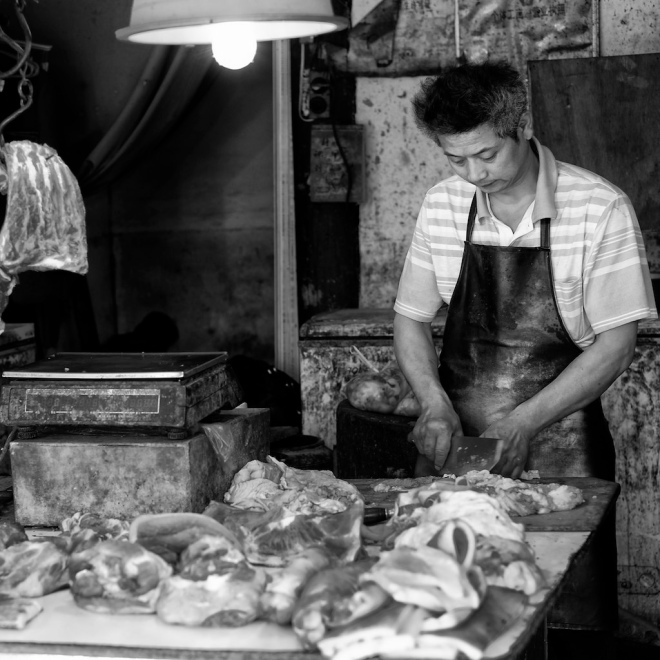
Surprisingly, the Zhuangzi has its own article on the Stanford Encyclopedia of Philosophy, but after reading it, Hui and I thought it to be contrived or misinterpreted.
“Cook Ting was cutting up an ox for Lord Wen-hui… He slithered the knife…in perfect rhythm. “Ah, this is marvelous!” said Lord Wen-hui. “Imagine skill reaching such heights!”
A “Strange” Interpretation
Chad Hansen, the author of the Encyclopedia’s article who’s a private professor at Hong Kong University, wrote that the tale of Butcher Ting illustrates the “world-guided” behavior with which we performers can find ourselves and goes on to say that it “reminds us that such satisfying states of performance can be experienced in.. the most low caste…activities, including butchering… as well as in the finest of arts, and philosophy.” Yet, Zhuangzi didn’t write to endorse the notion of fine arts and base activities, nor did he to endorse the notion of satisfactory performances. In fact, I believe Zhuangzi wrote the passage of the Butcher to emphasize nondistinction by illustrating perfection in Tao-abiding behavior. If he sought to remind us about such worldly matters as satisfactory performances, then Zhuangzi would be contradicting nondistinction, one of the most central principles of the philosophy.
“What I care about is the Way, which goes beyond skill. When I first began cutting up oxen, all I could see was the ox itself…now I go at it by spirit…”
Interpretations Must Follow
It is true that Zhuangzi lends itself to many interpretations. After all, the book uses a lot of figurative language, and maybe it does as a way to explore and approximate ideas like the Tao, acting with inaction, and the value of uselessness. Still, analogies, questions, and other devices abound for a reason. The author meant certain ideas, and to neglect this is to interpret another work. The intention of the author must be given priority. It must frame its interpretations. If a 21st century philosopher inserts his inclinations and presuppositions, is it the Zhuangzi anymore? Perhaps, or perhaps not, but my point is that interpretations imparting presuppositions undermines the creation of the text and the philosophy itself.
“I go along with the natural makeup, strike in the big hollows, guide the knife through the big openings, and follow things as they are. So I never touch the smallest ligament or tendon, much less a main joint.”
I thought I ought to cite Mr. Hansen:
Hansen, Chad, “Zhuangzi”, The Stanford Encyclopedia of Philosophy (Fall 2015 Edition), Edward N. Zalta (ed.), URL = <http://plato.stanford.edu/archives/fall2015/entries/zhuangzi/>.
The practice of Interpretation is debatable, so if you concur, let me know if I’m in good company, and if not, then let me know why, but regardless, consider following Tao Practiced.

Every-time I read your post, I find something new, 🙂
I have nominated you for “The Blogger Recognition Award”. Here is the link to it:
https://boringbug.wordpress.com/2017/02/05/blogger-recognition-award/
Congratulations!
LikeLiked by 1 person
Oakeshott, in ‘Politics of Rationalism’, took the parable to mean that governing is a practical skill, like butchery, that you can’t learn by talking about. That is probably not all that is in the parable, but any interpretation stressing the limits of language does fit well with a central theme of the work itself.
LikeLiked by 1 person
I am not qualified to discuss the deeper meanings of Chinese philosophy, but what I always took this passage to mean is that the wise person understands and goes with the natural order of things, rather than try to fight or overcome the natural order.
LikeLiked by 1 person
I agree, but even our consensus is a little vague because this passage might be about aligning oneself with the Tao, and thus reaching perfection, or about the same thing, and thus not caring about the quality of the actions. But I know it is not about satisfactory performances, this ostentatious notion. Doesn’t that notion seem odd to you?
LikeLiked by 1 person
I think the main meaning of this story is the nature of rulership. Cook Ting’s method of butchering is a model for Lord Wen-hui for governing – that is, in accord with the nature of things, through the existing openings, rather than chopping blindly through main force.
There is another Taoist story – I’m not sure of the reference – in which a sage tells a ruler that governing a large empire is like cooking a small fish, which is to say, very very gently.
“Performance” is a word with many meanings, but what I take the word is mean is engaging in an activity in such as way as to please an audience or to please someone in authority or to meet a prescribed standard of excellence.
I think excellent performance is a goal of Confucianism, which is about disciplining oneself to do the right thing in the correct way, by means of education, ritual, etiquette and other methods of forming good habits. I think a Confucian, like many of those in the ancient Greco-Roman tradition, would say that the first duty of a ruler is to rule oneself.
The Taoists, as I understand them, are saying something different. Rather than strengthening the will, they advocate understanding and conforming to your own nature and the nature of the world.
LikeLiked by 1 person
I see your points, Phil, and I’d like to add that Zhuangzi wrote that “a governor’s” best rule is to allow not impede the constituents.
LikeLike
The butcher is an ancient profession. I love these handed-down skills …
LikeLiked by 1 person